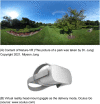Virtual reality cognitive intervention for heart failure: CORE study protocol
- PMID: 35317082
- PMCID: PMC8923344
- DOI: 10.1002/trc2.12230
Virtual reality cognitive intervention for heart failure: CORE study protocol
Abstract
Introduction: Heart failure (HF) is a prevalent, serious chronic illness that affects 6.5 million adults in the United States. Among patients with HF, the prevalence of attention impairment is reported to range from 15% to 27%. Although attention is fundamental to human activities including HF self-care, cognitive interventions for patients with HF that target improvement in attention are scarce. The COgnitive intervention to Restore attention using nature Environment (CORE) study aims to test the preliminary efficacy of the newly developed Nature-VR, a virtual reality-based cognitive intervention that is based on the restorative effects of nature. Nature-VR development was guided by Attention Restoration Theory. The target outcomes are attention, HF self-care, and health-related quality of life (HRQoL). Our exploratory aims examine the associations between attention and several putative/established HF biomarkers (eg, oxygen saturation, brain-derived neurotrophic factor, apolipoprotein E, dopamine receptor, and dopamine transporter genes) as well as the effect of Nature-VR on cognitive performance in other domains (ie, global cognition, memory, visuospatial, executive function, and language), cardiac and neurological events, and mortality.
Methods: This single-blinded, two-group randomized-controlled pilot study will enroll 74 participants with HF. The Nature-VR intervention group will view three-dimensional nature pictures using a virtual reality headset for 10 minutes per day, 5 days per week for 4 weeks (a total of 200 minutes). The active comparison group, Urban-VR, will view three-dimensional urban pictures using a virtual reality headset to match the Nature-VR intervention in intervention dose and delivery mode, but not in content. After baseline interviews, four follow-up interviews will be conducted to assess sustained effects of Nature-VR at 4, 8, 26, and 52 weeks.
Discussion: The importance and novelty of this study consists of using a first-of-its kind, immersive virtual reality technology to target attention and in investigating the health outcomes of the Nature-VR cognitive intervention among patients with HF.
Keywords: apolipoprotein E; attention; augmented reality; biomarkers; brain‐derived neurotrophic factor; clinical trial protocol; cognition; dopamine receptor; dopamine transporter; genomics; heart failure; virtual reality.
© 2022 The Authors. Alzheimer's & Dementia: Diagnosis, Assessment & Disease Monitoring published by Wiley Periodicals, LLC on behalf of Alzheimer's Association.
Conflict of interest statement
Miyeon Jung received the American Heart Association Career Development Award [19CDA34520006] to support this CORE study. Liana G. Apostolova, Debra K. Moser, Sujuan Gao, and Susan J. Pressler have served as mentors on the grant. Jeff L. Rogers is a consultant on the grant. All authors have no other relationships/activities/interests to disclose related to the content of this submission.
Figures
References
-
- Benjamin EJ, Virani SS, Callaway CW, et al. Heart disease and stroke statistics—2018 update: a report from the American Heart Association. Circulation. 2018;137(12):e67‐e492. - PubMed
-
- Pressler SJ. Cognitive functioning and chronic heart failure: a review of the literature (2002‐July 2007). J Cardiovasc Nurs. 2008;23(3):239‐249. - PubMed
-
- Vogels RL, Scheltens P, Schroeder‐Tanka JM, et al. Cognitive impairment in heart failure: a systematic review of the literature. Eur J Heart Fail. 2007;9(5):440‐449. - PubMed
Grants and funding
LinkOut - more resources
Full Text Sources
Research Materials
Miscellaneous



